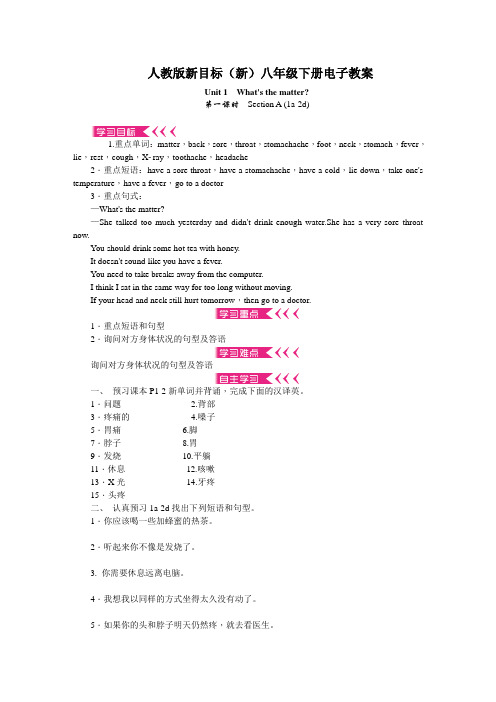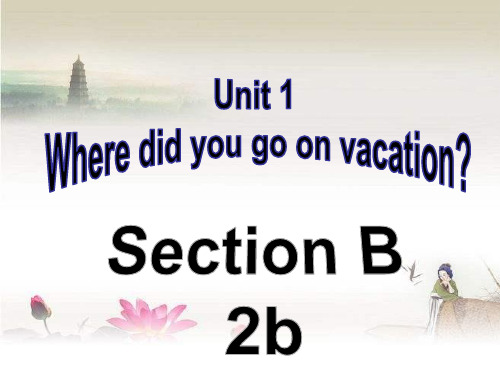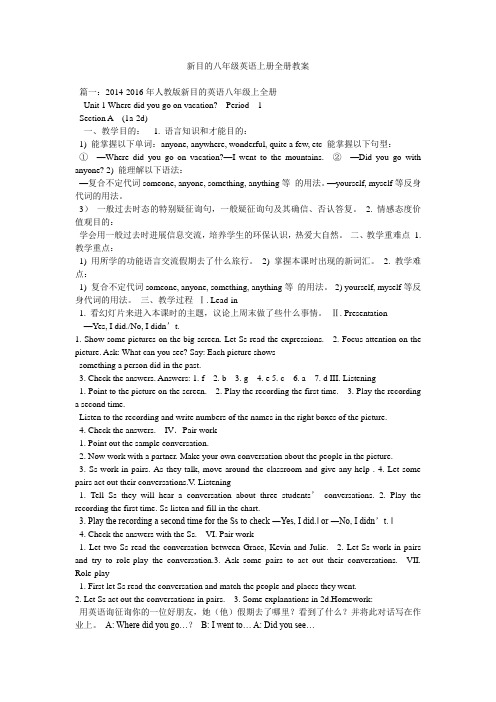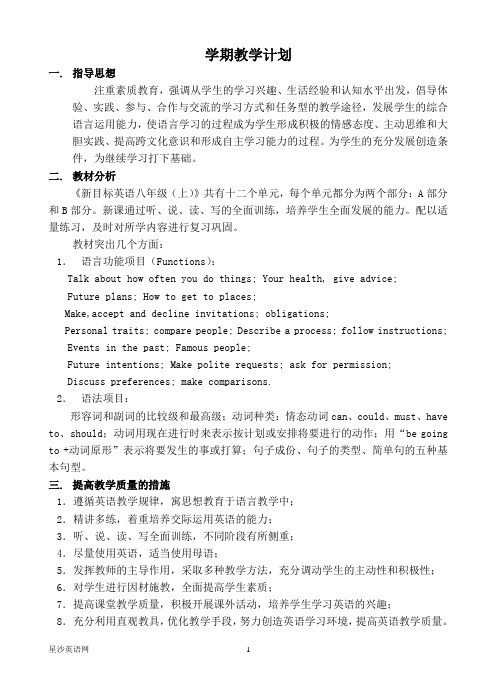新目标英语八年级
人教版新目标八年级英语下册全册电子版教案

人教版新目标(新)八年级下册电子教案Unit 1What's the matter?第一课时Section A (1a-2d)1.重点单词:matter,back,sore,throat,stomachache,foot,neck,stomach,fever,lie,rest,cough,Xray,toothache,headache2.重点短语:have a sore throat,have a stomachache,have a cold,lie down,take one's temperature,have a fever,go to a doctor3.重点句式:—What's the matter?—She talked too much yesterday and didn't drink enough water.She has a very sore throat now.You should drink some hot tea with honey.It doesn't sound like you have a fever.You need to take breaks away from the computer.I think I sat in the same way for too long without moving.If your head and neck still hurt tomorrow,then go to a doctor.1.重点短语和句型2.询问对方身体状况的句型及答语询问对方身体状况的句型及答语一、预习课本P1-2新单词并背诵,完成下面的汉译英。
1.问题____________ 2.背部____________3.疼痛的____________ 4.嗓子____________5.胃痛____________ 6.脚____________7.脖子____________ 8.胃____________9.发烧____________ 10.平躺____________11.休息____________ 12.咳嗽____________13.X光____________ 14.牙疼____________15.头疼____________二、认真预习1a-2d找出下列短语和句型。
人教版新目标八年级Unit-1-Section-B-2b详解-PPT

lunch. (A )2. The boy felt like his leg was broken.
2. And because of the bad weather, we couldn’t see anything below. because of意为“因为”,后跟名词。 e.g. They didn’t go fishing because of the bad weather. 因为天气不好所以他们没有去钓 鱼。
【人教版】新目标八年级英语上册:Unit 2 单元说课稿

【人教版】新目标八年级英语上册:Unit 2 单元说课稿一. 教材分析新目标八年级英语上册Unit 2主要讲述了关于一般现在时的用法。
本单元包括两个部分:Section 1和Section 2。
Section 1主要介绍了一般现在时的基本结构和用法,通过一个关于家庭成员的对话和一个关于日常活动的,让学生理解和掌握一般现在时的构成和表示含义。
Section 2则通过一个故事和一个任务型阅读,进一步巩固一般现在时的用法,并引导学生运用一般现在时进行叙述和描述。
二. 学情分析八年级的学生已经掌握了英语学习的基本语法和词汇,具备一定的听、说、读、写能力。
但对于一般现在时的理解和运用,部分学生可能还存在一定的困难。
因此,在教学过程中,需要关注学生的个体差异,针对性地进行教学,帮助学生理解和掌握一般现在时的用法。
三. 说教学目标1.知识目标:学生能够理解一般现在时的概念、结构和用法,能够正确运用一般现在时进行叙述和描述。
2.能力目标:学生能够在日常交流中运用一般现在时,提高英语表达的能力。
3.情感目标:通过本单元的学习,学生能够培养对英语学习的兴趣,增强自信心。
四. 说教学重难点1.教学重点:一般现在时的结构、用法和意义。
2.教学难点:一般现在时的运用,特别是在具体情境中的运用。
五. 说教学方法与手段1.教学方法:采用任务型教学法、情境教学法和交际法,让学生在实际情境中理解和运用一般现在时。
2.教学手段:利用多媒体课件、图片、故事等教学资源,激发学生的学习兴趣,提高课堂参与度。
六. 说教学过程1.导入:通过一个与学生生活密切相关的场景,如询问学生家庭成员的姓名和年龄,引导学生进入一般现在时的学习。
2.新课呈现:通过一个关于家庭成员的对话和一个关于日常活动的,展示一般现在时的结构和用法。
3.实践环节:学生分组进行角色扮演,运用一般现在时进行对话,巩固所学知识。
4.任务型阅读:学生阅读一个关于故事的文章,回答相关问题,进一步理解一般现在时的用法。
【人教版】新目标八年级英语上册:Unit 1 单元教学设计

【人教版】新目标八年级英语上册:Unit 1 单元教学设计一. 教材分析人教版新目标八年级英语上册Unit 1主要围绕“How do you get to school?”这一主题展开,通过引入不同交通工具的图片和情景对话,让学生掌握一般现在时的表达方式,以及询问和回答他人如何去学校的句子结构。
教材通过丰富的语言材料,旨在培养学生的听说读写技能,提高他们的语言运用能力。
二. 学情分析八年级的学生已经掌握了基本的英语语法和词汇,具备一定的听说读写能力。
他们在学习过程中需要更多的实际语境和实践机会来提高语言运用能力。
此外,学生对于新事物的接受能力较强,但部分学生可能对英语学习缺乏兴趣,需要教师通过有趣的教学活动来激发他们的学习热情。
三. 教学目标1.知识目标:学生能够掌握一般现在时的表达方式,学会用英语询问和回答他人如何去学校。
2.能力目标:学生能够在实际情境中运用所学知识进行交流,提高听说读写技能。
3.情感目标:培养学生热爱生活,关注环保的价值观。
四. 教学重难点1.重点:一般现在时的表达方式,以及询问和回答他人如何去学校的句子结构。
2.难点:如何运用所学知识进行实际交流,提高语言运用能力。
五. 教学方法采用任务型教学法,通过引入真实情境,让学生在实际交流中掌握知识点。
同时运用分组合作、角色扮演等教学手段,激发学生的学习兴趣,提高他们的参与度。
六. 教学准备1.教材:人教版新目标八年级英语上册。
2.教具:多媒体设备、图片、卡片等。
3.教学资源:网络资源、相关视频等。
七. 教学过程1.导入(5分钟)利用多媒体展示不同交通工具的图片,引导学生谈论自己如何去学校。
教师通过提问学生,激发他们的学习兴趣。
2.呈现(10分钟)教师通过展示教材中的情景对话,让学生听懂并理解对话内容。
随后,引导学生跟读对话,纠正发音。
3.操练(10分钟)将学生分成小组,让他们模拟对话情景,进行角色扮演。
教师巡回指导,纠正错误,并给予鼓励。
新目标八年级英语上册全册教案

新目的八年级英语上册全册教案篇一:2014-2016年人教版新目的英语八年级上全册Unit 1 Where did you go on vacation? Period 1Section A (1a-2d)一、教学目的: 1. 语言知识和才能目的:1) 能掌握以下单词:anyone, anywhere, wonderful, quite a few, etc 能掌握以下句型:①—Where did you go on vacation?—I went to the mountains. ②—Did you go with anyone? 2) 能理解以下语法:—复合不定代词someone, anyone, something, anything等的用法。
—yourself, myself等反身代词的用法。
3)一般过去时态的特别疑征询句,一般疑征询句及其确信、否认答复。
2. 情感态度价值观目的:学会用一般过去时进展信息交流,培养学生的环保认识,热爱大自然。
二、教学重难点1. 教学重点:1) 用所学的功能语言交流假期去了什么旅行。
2) 掌握本课时出现的新词汇。
2. 教学难点:1) 复合不定代词someone, anyone, something, anything等的用法。
2) yourself, myself等反身代词的用法。
三、教学过程Ⅰ. Lead-in1. 看幻灯片来进入本课时的主题,议论上周末做了些什么事情。
Ⅱ. Presentation —Yes, I did./No, I didn’t.1. Show some pictures on the big screen. Let Ss read the expressions.2. Focus attention on the picture. Ask: What can you see? Say: Each picture showssomething a person did in the past.3. Check the answers. Answers: 1. f 2. b 3. g4. e5. c6. a7. d III. Listening1. Point to the picture on the screen.2. Play the recording the first time.3. Play the recordinga second time.Listen to the recording and write numbers of the names in the right boxes of the picture.4. Check the answers. IV.Pair work1. Point out the sample conversation.2. Now work with a partner. Make your own conversation about the people in the picture.3. Ss work in pairs. As they talk, move around the classroom and give any help .4. Let some pairs act out their conversations.V. Listening1. Tell Ss they will hear a conversation about three students’conversations.2. Play the recording the first time. Ss listen and fill in the chart.3. Play the recording a second time for the Ss to check ―Yes, I did.‖ or ―No, I didn’t. ‖4. Check the answers with the Ss. VI. Pair work1. Let two Ss read the conversation between Grace, Kevin and Julie.2. Let Ss work in pairs and try to role-play the conversation.3. Ask some pairs to act out their conversations. VII. Role-play1. First let Ss read the conversation and match the people and places they went.2. Let Ss act out the conversations in pairs.3. Some explanations in 2d.Homework:用英语询征询你的一位好朋友,她(他)假期去了哪里?看到了什么?并将此对话写在作业上。
人教版新目标八年级上册英语单词表

人教版新目标八年级英语上册课本分单元词汇表Unit1how often 多久一次exercise v.& n.锻炼skateboard v.踩滑板hardly adv.几乎不ever adv.曾,曾经once adv.一次twice adv.两次time n.次,次数surf v.在…冲浪Internet n.网络program n.节目,表演high school 高中,完全中学result n.结果active adj.活跃的,积极的for prep.对于,在…方面as for 至于,关于about adv.几乎,大约junk n.废弃的旧物junk food 垃圾食品milk n.牛奶coffee n.咖啡chip n.(食物等的)薄片cola n.可乐chocolate n.巧克力drink v.喝,饮health n.健康,健康状况how many 多少interviewer n.采访者habit n.习惯try v.试图,设法,努力of course 当然look after 照顾,照看lifestyle n.生活方式grade n.分数,成绩better adj.& adv.更好的(地)same adj.同样的,相同的as prep.像…一样different adj.不同的,有区别的difference n.不同,差异,区别unhealthy adj.不健康的maybe adv.或许,大概although conj.虽然,即使for prep.达,计grandpa n.外公,爷爷a lot of 大量,许多keep v.保持must modal v.必须less adj.更小的,较少的Unit2matter n.事情,问题have v.得(病),患(病)cold n.受凉,感冒have a cold 得了感冒stomachache n.胃痛sore adj.疼痛的back n.背,背部arm n.臂,胳膊ear n.耳朵eye n.眼睛foot n.脚,足hand n.手head n.头,头部leg n.腿,腿部mouth n.嘴neck n.脖子,颈部nose n.鼻子stomach n.胃tooth n.牙齿throat n.喉咙toothache n.牙痛fever n.发烧,发热rest v.休息honey n.蜂蜜dentist n.牙医should modal v.应该headache n.头痛shouldn't=should notago adv.以前so pron.如此,这样illness n.疾病advice n.劝告thirsty adj.渴的stress v.加压力于,使紧张(be)stressed out 有压力的,紧张的early adv.提早(地)problem n.问题way n.方法,手段,方式traditional adj.传统的believe v.相信,认为balance n.平衡,平衡状态weak adj.虚弱的,无力的herb n.草本植物,药草angry adj.愤怒的,生气的tofu n.豆腐medicine n.药物western adj.西方的everybody pron.每人,人人get v.变得few adj.很少的a few 有些,几个,少数stay v.继续是,保持important adj.重要的balanced adj.平衡的diet n.饮食,节食moment n.瞬间,片刻at the moment 此时until conj.直到…之时host family 寄宿家庭hear v.听见,听说Unit3babysit v.临时照顾(小孩)camp v.宿营plan n.& v.计划,规划Tibet 西藏hike v.徒步旅行,远足Hong Kong 香港how long 多久,多长时间away adv.向远处get back 回来send v.发送,寄postcard n.明信片San Francisco 旧金山Hawaii 夏威夷bike n.自行车ride v.乘骑n.旅行的路程sightseeing n.观光,游览fishing n.捕鱼rent v.租用,出租Italy 意大利famous adj.著名的,出名的take a vacation 去度假Greece 希腊Spain 西班牙Europe n.欧洲something pron.某物,某事lake n.湖,湖泊the Great Lakes 五大湖leave v.离开,出发countryside n.农村,乡村nature n.大自然,自然界forget v.忘记a lot 很,常常,非常finish v.结束,完成Thailand 泰国tourist n.旅行者Unit4subway n.地铁train n.火车forty num.四十fifty num.五十sixty num.六十seventy num.七十eighty num.八十ninety num.九十hundred num.一百minute n.分钟take v.花费(时间)by prep.表示交通方式by bus 乘坐公共汽车far adj.远的,遥远的how far 多远kilometer n.公里,千米shower v.淋浴quick adj.快的bicycle n.自行车early adj.早的,提早的mile n.英里stop n.车站transportation n.公共交通,运输north adj.北部的,北方的North America 北美洲part n.地区depend v.依赖,依靠depend on 视…而定river n.河,江boat n.小船by boat 乘小船must modal v.一定more adj.& adv.更多的(地)than conj.比means n.方法,手段,工具car n.小汽车town n.镇,城镇ill adj.生病的,不健康的worry v.担心,担忧,焦虑so adv.这么,那么much adv.十分,非常Unit5lesson n.课,课程another adj.又一的,再一的concert n.音乐会whom pron.谁,什么人calendar n.日历tomorrow n.& adv.明天the day after tomorrow 后天weekday n.工作日invitation n.邀请,邀请书training n.训练,锻炼chemistry n.化学American adj.美国的project n.(学校的)课题,项目matches n.比赛,竞赛whole adj.整个的,全部的over adv.从一边至另一边come over 顺便来访free adj.空闲的,有空的till conj.直到…之时Unit6outgoing adj.友好的,外向的twin adj.& n.孪生的calm adj.镇静的wild adj.鲁莽的serious adj.严肃的athletic adj.擅长运动的note n.注释mean v.表示…的意思as adv.以…的方式way n.某个方面both pron.两个(都)hers pron.她的(所有物)physics n.物理however adv.然而more than 超出in common 公有的,共有的be good at 擅长,在…方面做得好school work n.学业laugh v.笑for prep.为,给,对opposite adj.对立的view n.观点interest n.兴趣though adv.& conj.虽然necessary adj.必要的beat v.打败care v.对…在意friendship n.友情primary adj.初级的,小学的primary school 小学information n.消息,信息Units1-6wheel n.轮子woman n.女人use v.使用cheese n.干酪,奶酪sick adj.不适的,患病的body n.身体begin v.开始begin with 以…开始swimming pool 游泳池excited adj.激动的Harbin 哈尔滨safe adj.安全的,可靠的fast adj.& adv快的(地)passenger n.乘客Unit7shake n.奶昔milk shake 奶昔blender n.搅拌机turn on 打开cut v.切,割up adv.分开cut up 切碎peel v.剥,削pour v.倾倒into prep.到…里yogurt n.酸奶ingredient n.材料cup n.小茶杯watermelon n.西瓜teaspoon n.茶匙amount n.总额instruction n.命令finally adv.最后地,最终mix v.混合mix up 混合在一起popcorn n.爆米花popper n.爆米花机boil v.煮沸salt n.盐add v.加,加添add…to… 把…加到…上sandwich n.三明治bread n.面包butter n.黄油relish n.调味品lettuce n.生菜,莴苣turkey n.火鸡slice n.薄片super adj.超级的top n.顶,上部recipe n.烹调法check v.核对,检查green onion 嫩洋葱duck n.鸭子sauce n.调味汁pancake n.薄煎饼roll v.卷Unit8gift n.礼物shark n.鲨鱼aquarium n.水族馆seal n.海豹hang v.逗留,徘徊hang out 闲荡,闲逛souvenir n.纪念物win v.赢,获胜autograph n.亲笔签名prize n.奖赏,奖金visitor n.访问者,参观者outdoor adj.户外的octopus n.章鱼end n.结束monitor n.班长Chicago 芝加哥California 加利福尼亚州sleep late 睡过头drive n.驾驶off adj.休息day off 不工作rain n.雨DVD abbr.数字化视频光盘yard n.院子yard sale 庭院旧货出售luckily adv.幸运地umbrella n.雨伞raincoat n.雨衣wet adj.潮湿的competition n.竞争,比赛,竞赛player n.运动员future n.将来again adv.再一次Unit 9born v.出生record n.记录hiccup v.& n.打嗝sneeze v.& n.(打)喷嚏too…to… 太…以至于不能…golf v.& n.(打)高尔夫球Brazilian adj.巴西的national adj.国家的achievement n.成就perform v.演出,表演gymnast n.体操运动员gold n.金子adj.金的medal n.奖牌championship n.冠军称号golfer n.高尔夫球运动员become v.成为call v.把…叫做talented adj.有天赋的loving adj.慈爱的creative adj.有创造力的outstanding adj.杰出的kind adj.和蔼的unusual adj.不寻常的grandson n.孙子violinist n.小提琴手skate v.滑冰,溜冰ice skating 滑冰champion n.冠军tour v.在…旅行the US 美利坚合众国,美国well-known adj.有名的pianist n.钢琴手could modal v.能(can的过去式)hum v.作嗡嗡声,哼唱piece n.幅,篇,首accordion n.手风琴take part(in) 参加…Poland 波兰alive adj.活着的athlete n.运动员because of 因为,由于Asia 亚洲table tennis 乒乓球运动university n.大学major v.主修major in 主修,专研management n.管理number n.号码single n.单打比赛ITTF abbr.国际乒乓球联合会Unit10grow v.生长grow up 成长programmer n.电脑程序设计者computer science 计算机科学engineer n.工程师pilot n.飞行员professional adj.专业的act v.表演move v.移动dream n.梦somewhere adv.在某处exhibition n.展览artist n.艺术家part-time adj.兼职的save v.储蓄at the same time 同时hold v.举行rich adj.富有的travel v.旅行all over 到处retire v.退休yet adv.到此时resolution n.决心instrument n.器具,乐器over prep.超过fax n.传真reader n.读者fit adj.强健的communicate v.交流lady n.女士foreign adj.外国的build v.建造exchange n.& v.交换exchange student 交换生Unit11chore n.杂务dish n.盘do the dishes 洗餐具sweep v.扫除trash n.垃圾take out 取出make one's bed 整理床铺fold v.折叠living room 起居室meeting n.会议work on 从事,忙于hate v.憎恨do chores 干家务laundry n.洗衣店do the laundry 洗衣服snack n.小吃teenager n.青少年borrow v.借invite v.邀请player n.唱机care n.照顾take care of 照看feed v.喂养mine pron.我的(所有物)Unit12radio n.无线电radio station 无线电台comfortable adj舒适的seat n.座位screen n.屏幕close adj.近的service n.服务quality n.品质theater n.剧院cinema n.电影院clothing n.衣服jeans n.(pl.)牛仔裤trendy adj.时髦的teen n.青少年funky adj.时髦的,极好的easy adj.安逸的,自在的FM abbr.(广播)调频AM abbr.(广播)调幅jazz n.爵士乐worse adj.& adv.更坏的worst adj.& adv.最坏的bargain n.特价商品meal n.餐,饭positive adj.积极的negative adj.消极的dull adj.乏味的loud adj.响亮的talent n.天才talent show 才艺表演performer n.演员success n.成功act n.一段表演without prep.无,没有together adv.一起musical adj.音乐的distance n.距离near adj.近的farthest adj.& adv.最远的province n.省份southern adj.南方的still adv.还,仍然lovely adj.美丽的,可爱的northern adj.北方的enough adj.充足的,足够的Units7-12sea n.海洋DJ abbr.音乐节目主持人Los Angeles 洛杉矶central adj.中心的diner n.小饭店,路边小餐馆curry n.咖喱deli n.熟食店leader n.领导者band n.管乐队easy adj.容易的piece n.片brown bread 黑面包forbid v.禁止Forbidden City 故宫camel n.骆驼rat n.老鼠(not)at all 丝毫(也不)cow n.母牛,奶牛seriously adv.严肃地hen n.母鸡lay v.产(卵)11。
新目标英语八年级上册全套教案

学期教学计划一. 指导思想注重素质教育,强调从学生的学习兴趣、生活经验和认知水平出发,倡导体验、实践、参与、合作与交流的学习方式和任务型的教学途径,发展学生的综合语言运用能力,使语言学习的过程成为学生形成积极的情感态度、主动思维和大胆实践、提高跨文化意识和形成自主学习能力的过程。
为学生的充分发展创造条件,为继续学习打下基础。
二. 教材分析《新目标英语八年级(上)》共有十二个单元,每个单元都分为两个部分:A部分和B部分。
新课通过听、说、读、写的全面训练,培养学生全面发展的能力。
配以适量练习,及时对所学内容进行复习巩固。
教材突出几个方面:1.语言功能项目(Functions):Talk about how often you do things; Your health, give advice;Future plans; How to get to places;Make,accept and decline invitations; obligations;Personal traits; compare people; Describe a process; follow instructions; Events in the past; Famous people;Future intentions; Make polite requests; ask for permission;Discuss preferences; make comparisons.2.语法项目:形容词和副词的比较级和最高级;动词种类:情态动词can、could、must、have to、should;动词用现在进行时来表示按计划或安排将要进行的动作;用“be going to +动词原形”表示将要发生的事或打算;句子成份、句子的类型、简单句的五种基本句型。
三. 提高教学质量的措施1.遵循英语教学规律,寓思想教育于语言教学中;2.精讲多练,着重培养交际运用英语的能力;3.听、说、读、写全面训练,不同阶段有所侧重;4.尽量使用英语,适当使用母语;5.发挥教师的主导作用,采取多种教学方法,充分调动学生的主动性和积极性;6.对学生进行因材施教,全面提高学生素质;7.提高课堂教学质量,积极开展课外活动,培养学生学习英语的兴趣;8.充分利用直观教具,优化教学手段,努力创造英语学习环境,提高英语教学质量。
【人教版】新目标八年级英语上册:Unit 4 单元教学设计

【人教版】新目标八年级英语上册:Unit 4 单元教学设计一. 教材分析人教版新目标八年级英语上册Unit 4主要介绍了日常生活中的交通工具,以及人们在交通方面的观点和态度。
通过本单元的学习,学生能够掌握有关交通工具的词汇和表达方式,学会描述自己的交通方式,并在实际情境中运用所学知识进行交流。
二. 学情分析八年级的学生已经具备了一定的英语基础,对于日常生活中的事物和情境有了一定的认识。
但部分学生在英语口语表达方面还存在困难,需要通过大量的练习来提高。
此外,学生对于交通方面的知识和观点可能了解不多,需要在教学过程中加以引导和拓展。
三. 教学目标1.知识目标:学生能够掌握有关交通工具的词汇和表达方式,了解日常生活中的交通方式,以及不同人在交通方面的观点和态度。
2.能力目标:学生能够运用所学知识进行日常交流,提高英语口语表达能力。
3.情感目标:学生能够养成良好的交通习惯,关注交通安全,树立正确的交通观念。
四. 教学重难点1.重点:掌握有关交通工具的词汇和表达方式,能够在实际情境中运用所学知识进行交流。
2.难点:对于不同人在交通方面的观点和态度的理解,以及如何在实际情境中运用所学知识进行交流。
五. 教学方法1.任务型教学法:通过设定各种交通情境,让学生在完成任务的过程中运用所学知识,提高实际运用能力。
2.情境教学法:创设各种真实的交通情境,激发学生的学习兴趣,提高学生的参与度。
3.小组合作学习:鼓励学生分组讨论,培养学生的团队协作能力和口头表达能力。
六. 教学准备1.教学课件:制作与Unit 4相关的课件,包括交通工具的图片、视频等,以便于引导学生进行学习。
2.学习材料:准备有关交通的阅读材料,帮助学生拓展视野,提高阅读能力。
3.教学道具:准备一些交通工具的模型或图片,方便学生进行直观的学习和理解。
七. 教学过程1.导入(5分钟)通过展示一些交通工具的图片,引导学生谈论自己喜欢的交通工具,激发学生的学习兴趣。
- 1、下载文档前请自行甄别文档内容的完整性,平台不提供额外的编辑、内容补充、找答案等附加服务。
- 2、"仅部分预览"的文档,不可在线预览部分如存在完整性等问题,可反馈申请退款(可完整预览的文档不适用该条件!)。
- 3、如文档侵犯您的权益,请联系客服反馈,我们会尽快为您处理(人工客服工作时间:9:00-18:30)。
新目标英语八年级(上)Unit4说课稿
How do you get to school?
一、教材分析:
教材的地位及作用:
1、单元分析及教材处理
本课是新目标英语八年级上册第4单元第一课.本单元围绕谈论交通工具(transportation)和距离为中心话题,这个题材开展多种教学活动,与上一单元联系紧密.本节课是本单元的重点.通过学习谈论交通方式,为今后学习合理安
排行程,合理选用交通工具以及设计实践调查报告并提出解决问题的简单方案打下基础,同时通过How do you get to sp?以及pairwork的反复操练,进一步提高学生听、说、读、写综合素质能力。
2、教学目标:
知识目标:
(1)Language goal:How do you get to schl
I take the bus.How does he go to school? He take the bus.
(2)学习单词:subway,train, take,复习学过的bus、ride bike、wake、car这些表交通方式的单词[我对单词的处理:利用PPt演示图片教学与复习]
能力目标:通过学习,掌握现代生活中常用的交通工具,学会谈论交通方式。
提高学生听、说、读、写综合能力,提高学生对一般现在时态用法、结构的理解和使用。
情感目标:通过本课学习,使学生在人际交往中学会尊重和理解别人,学会交换不同的看法,了解他人的喜好,增进情谊。
确立教学目标的依据:
根据英语教学大纲规定,通过听、说、读、写的训练,使学生获得英语基础知识和为交际初步运用英语的能力,激发学生的学习兴趣,为进一步学习打好初步的基础。
此外,也根据我国国情和外语教学大纲的要求,根据现阶段外语教学的素质教育的要求.
3、重点与难点:
重点:掌握各种交通工具的名称,学会表述自己和谈论他人的交通方式。
句型:How引导的特殊疑问句
难点:一般现在时态第一到第三人称表述词形的变化
确立重点与难点的依据:
根据教学大纲的要求,本课在教材中所处的地位和作用,及学生实际学习中的普遍反应。
教材处理:
根据以上对教材的分析,同时针对中国学生学习外语存
在一定困难的实际情况。
首先通过PPt给学生创造情景,真实的感官感受,身临其境地把学生带到所设计的语言情景中,激发学生学习兴趣,使学生在参与的一系列活动中,掌握知识。
最后通过Pairwork、groupwork及练习达到突破难点和巩固的目的。
教法和学法:
通过情景教学法、任务型教学法,由听到说,已知到未知,循序渐进地深化教学内容。
展开教师为主导,以学生为主体的师生双边教学活动。
1、教学手段:多媒体辅助:使抽象的学习内容直观化,创设情景,实现师生互动,生生互动和人机互动的多向互动,增加了直观性和趣味性,加大了课堂密度,提高了教学效果。
2、学法指导:
新制定的《英语课程标准》把“培养学生学习英语的兴趣,树立自信心,培养良好学习习惯和形成有效策略,发展自主学习和合作精神”放在了首位.根据依据课改的精神,遵循学生的认知规律,从单词—句子—情景对话—情景短剧—实际应用,采取循序渐进的原则,由浅入深,由易到难。
情景兴趣教学。
如何使用英语,如何在理解的基础上习得语言。
在用中学,学中用。
学会自己自主推测发现归纳提高,提高学习自主性和互助能力。
三、教学程序:
1、新课导入
师生间,生生间问答星期,日期,天气;用where, who,when, how long谈论假期。
然后采用听说法和多媒体辅助教学来导入和呈现本节课的基本词汇和句型,目的在于用师生、学生与学生互动的方式,共同观察图片、视屏,激活学生对所学知识的已有体验,使学生对新词语和基本语言目标的识记,经过一个由形象思维到抽象思维的转化过程,因此记忆效果更好。
2、新课的讲解
本课利用多媒体教学手段展示了一幅幅色彩逼真、形象生动的画面,复习和学习新词,将how所引导的特殊疑问句在一系列既关联又相对独立的语境中详细讲解,反复演练,使学生全面掌握。
任务性听力训练1B.以及1c,pairwork其中多媒体展示的动画,充分地调动学生的积极性,吸引全体学生的注意力,达到教育教学目的,培养学生思想素质、情感素质和英语语言素质。
3、反复操练和巩固应用
为了调动学生的积极性,利用,inpairs,inrow,ingroup,及Boysask,Girlsanswer等多种不同方式操练巩固。
使学生处于积极思维的状态之中,全方位、多角度培养学生运用英语的能力。
4、反馈练习
这一环节也是巩固和突破难点的环节,设计练习,让学
生在做题过程中暴露问题,通过自主发现并改正错误等方式
达到更好的理解和巩固一般现在时态的用法。
5、归纳总结
本课除了板书所呈现的重点内容外,又把本课内容以练
习的方式,巧妙地巩固了本课重点、难点..进一步巩固,加
强对本课内容的理解和运用。
6、展示板书
Unit 4 How do you get to school?
A: How do you get to school? A:How does he get to school?
B: I walk. B:He walks。
ride the bike. rides the bike take the bus takes the bus
take the train takes the train
take the subway takes the subway
7.作业:布置作业:
这一环节既为这一课做好巩固,收尾,又为下节课做好
铺垫和准备工作,故非常
重要。
其一,针对整篇文章重点,首先让学生变换人称
练习,来培训学生组织语言、应用语言的综合能力。
其二,将此篇对话改写成一个短剧,由小组合作完成,发挥学生的创造力和想象力,把语言切实应用到生活实际中来。
最后,预习下一课内容。
结束:以上,我仅从说教材,说学情,说教法,说学法,说教学程序上说明了“教什么”和“怎么教”,阐明了“为什么这样教”,有不妥之处还望各位给以指导,谢谢!。
